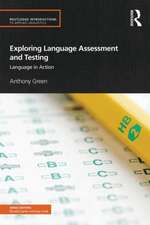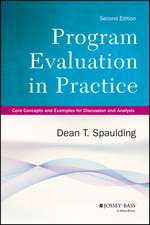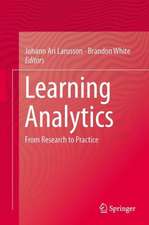New Directions in Educational Evaluation
Autor Ernest R. Houseen Limba Engleză Paperback – 6 mar 1986
Preț: 356.18 lei
Nou
Puncte Express: 534
Preț estimativ în valută:
68.17€ • 70.25$ • 57.55£
68.17€ • 70.25$ • 57.55£
Carte tipărită la comandă
Livrare economică 03-17 martie
Preluare comenzi: 021 569.72.76
Specificații
ISBN-13: 9781850000471
ISBN-10: 1850000476
Pagini: 270
Dimensiuni: 156 x 234 x 14 mm
Greutate: 0.45 kg
Ediția:1
Editura: Taylor & Francis
Colecția Routledge
Locul publicării:Oxford, United Kingdom
ISBN-10: 1850000476
Pagini: 270
Dimensiuni: 156 x 234 x 14 mm
Greutate: 0.45 kg
Ediția:1
Editura: Taylor & Francis
Colecția Routledge
Locul publicării:Oxford, United Kingdom
Cuprins
Part 1 Introduction: Evaluation and Legitimacy; Chapter 1 Evaluation and Legitimacy, Ernest R.House; Part 2 New Analyses: Issues and Metaphors; Chapter 2 Introduction; Chapter 3 The Conceptualization of Educational Evaluation: An Analytical Review of the Literature, DavidNevo; Chapter 4 How We Think about Evaluation, Ernest R.House; Part 3 Radical Propositions: Fusing Fact and Value; Chapter 5 Introduction; Chapter 6 Evaluation as a Paradigm for Educational Research, MichaelScriven; Chapter 7 The Feminist Evaluator Gill Kirkup Open University; Part 4 Naturalistic Evaluation: Acting from Experience; Chapter 8 Introduction; Chapter 9, Robert E.Stake; Chapter 10 Three Good Reasons for Not Doing Case Studies in Curriculum Research, RobWalker; Chapter 11 Seven Principles for Programme Evaluation in Curriculum Development and Innovation, StephenKemmis; Part 5 Part Icipatory Evaluation: The Stakeholder Approach; Chapter 12 Introduction; Chapter 13 The Stakeholder Approach to Evaluation: Origins and Promise, Carol H.Weiss; Chapter 14 The Evaluation of Push/Excel: A Case Study, EleanorFarrar, ErnestHouse; Chapter 15 Toward the Future of Stakeholder Approaches in Evaluation, Carol H.Weiss; Part 6 Teachers and Evaluation: Learning to Labor; Chapter 16 Introduction; Chapter 17 Teacher Evaluation in the Organizational Context: A Review of the Literature, LindaDarling-Hammond, Arthur E.Wise, Sara R.Pease;











